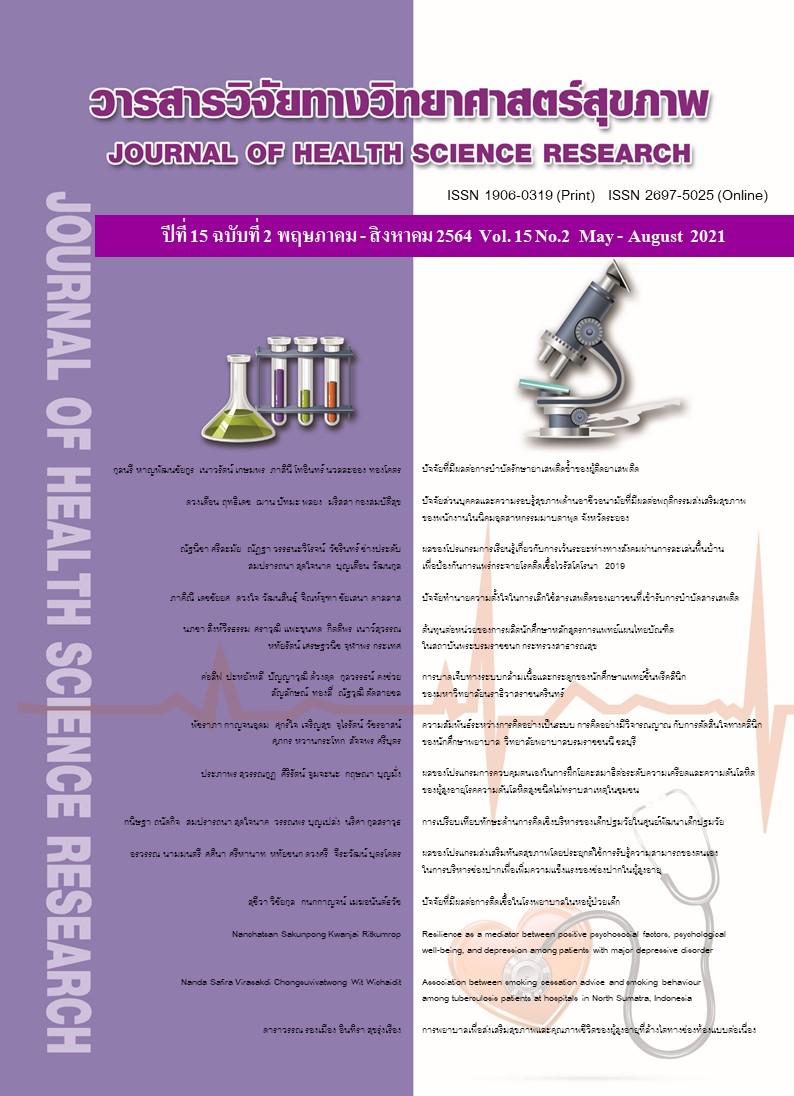การฟื้นฟูทางใจในฐานะตัวแปรส่งผ่านระหว่างปัจจัยเชิงสาเหตุด้านจิตสังคมเชิงบวกกับสุขภาวะทางใจและภาวะซึมเศร้าในผู้ป่วยโรคซึมเศร้า
Main Article Content
บทคัดย่อ
บทนำ : โรคซึมเศร้าเป็นปัญหาสุขภาพจิตที่ส่งผลต่อการดำเนินชีวิตของบุคคล แม้จะมีแนวทางการรักษาด้วยยาและจิตบำบัด หากแต่ยังขาดการศึกษาปัจจัยด้านจิตสังคมเชิงบวกโดยเฉพาะการฟื้นฟูทางใจอันจะนำไปสู่การส่งเสริมสุขภาวะทางใจและลดภาวะซึมเศร้าได้
วัตถุประสงค์การวิจัย : เพื่อตรวจสอบปัจจัยเชิงสาเหตุด้านจิตสังคมเชิงบวกที่มีต่อสุขภาวะทางใจและภาวะซึมเศร้าในผู้ป่วยโรคซึมเศร้าโดยมีการฟื้นฟูทางใจเป็นตัวแปรส่งผ่าน
วิธีการวิจัย : เป็นการศึกษาภาคตัดขวางในกลุ่มผู้ป่วยโรคซึมเศร้า จำนวน 250 คน ซึ่งได้รับการวินิจฉัยตามเกณฑ์ของการจำแนกโรคทางจิตเวช และวิเคราะห์ข้อมูลโดยการวิเคราะห์เส้นทาง
ผลการวิจัย : ความซาบซึ้งขอบคุณ การมีสติและการรับรู้การสนับสนุนทางสังคมสามารถทำนายการฟื้นฟูทางใจในขณะที่การฟื้นฟูทางใจสามารถทำนายการเกิดสุขภาวะทางใจและภาวะซึมเศร้าได้ นอกจากนั้นยังพบว่า ความซาบซึ้งขอบคุณยังสามารถทำนายภาวะซึมเศร้าได้
สรุปผล : การฟื้นฟูทางใจเป็นตัวแปรส่งผ่านที่สำคัญระหว่างความซาบซึ้งขอบคุณ การมีสติ การรับรู้การสนับสนุนทางสังคม กับการมีสุขภาวะทางใจและภาวะซึมเศร้า ดังนั้นผลการวิจัยในครั้งนี้สามารถนำไปใช้ในการดูแลผู้ป่วยโรคซึมเศร้าตามแนวคิดจิตวิทยาเชิงบวกที่ส่งเสริมความเติบโตงอกงามด้านศักยภาพของบุคคลได้
Downloads
Article Details
บทความที่ได้รับการตีพิมพ์เป็นลิขสิทธิ์ของวิทยาลัยพยาบาลบรมราชชนนี จังหวัดนนทบุรี
ข้อความที่ปรากฏในบทความแต่ละเรื่องในวารสารวิชาการเล่มนี้เป็นความคิดเห็นส่วนตัวของผู้เขียนแต่ละท่านไม่เกี่ยวข้องกับวิทยาลัยพยาบาลบรมราชชนนี จังหวัดนนทบุรี และคณาจารย์ท่านอื่น ในวิทยาลัยฯ แต่อย่างใด ความรับผิดชอบองค์ประกอบทั้งหมดของบทความแต่ละเรื่องเป็นของผู้เขียนแต่ละท่าน หากมีความผิดพลาดใด ๆ ผู้เขียนแต่ละท่านจะรับผิดชอบบทความของตนเองแต่ผู้เดียว
เอกสารอ้างอิง
Sadock BJ, Sadock VA, Ruiz P. Kaplan & Sadock's synopsis of psychiatry: Behavioral sciences/ clinical psychiatry. 11th edition/ Philadelphia: Wolters Kluwer, 2015.
Sakunpong N, Ritkumrop K. Psychometric properties of the Thai version psychological well-being scale and the factors related to Thai patients with major depressive disorder. Depress Res Treat. 2021; doi: 10.1155/2021/2592548.
Grant F, Guille C, Sen S. Well-Being and the risk of depression under Stress. PloS One. 2013;8(7):e67395. doi: 10.1371/journal.pone.0067395.
Maekawa T, Souda S, Oyakawa K, Tanaka M, Yamasaki T. Resilience in the first episode of major depressive disorder. Open J Med Psychol. 2017;6(2):115-25. doi: 10.4236/ojmp.2017.62009.
Hu T, Zhang D, Wang J. A meta-analysis of the trait resilience and mental health. Pers Indiv Differ. 2015;76:18-27. doi: 10. 1016/J.PAID.2014.11.039.
Loh JMI, Schutte NS, Thorsteinsson EB. Be happy: The role of resilience between characteristic affect and symptoms of depression. J Happiness Stud. 2014;15(5): 1125–38. doi: 10.1007/s10902-013-9467-2.
Idris I, Khairani AZ, Shamsuddin H. The influence of resilience on psychological well-being of Malaysian university undergraduates. Int J High Educ. 2019; 8(4):153-63. doi: 10.5430/ijhe.v8n4p153.
Singh K, Junnarkar M, Kaur J. Measures of positive psychology, Development and validation. Berlin: Springer; 2016.
Silpakit C, Silpakit O, Wisajun P. The validity of Philadelphia Mindfulness Scale Thai Version. Journal of Mental Health of Thailand. 2011;19(3):140-47. (in Thai).
Keye MD, Pidgeon AM. Investigation of the relationship between resilience, mindfulness, & academic self-efficacy. Open J Soc. Sci. 2013;1(6):1-4. doi: 10.4236/jss.2013.16001.
Kumar A, Dixit V. Forgiveness, gratitude and resilience among Indian youth. Indian Journal of Health and Wellbeing. 2014;5 (12):1414-19.
Fredrickson BL. The role of positive emotions in positive psychology. The broaden-and-build theory of positive emotions. Am Psychol. 2001;56(3):218–26. doi: 10.1037//0003-066x.56.3.218.
Southwick SM, Sippel L, Krystal J, Charney D, Mayes L, Pietrzak R. Why are some individuals more resilient than others: the role of social support. World Psychiatr. 2016;15(1):77-79. doi: 10.1002/ wps.20282.
Brajša-Žganec A, Kaliterna L, Marković IH. The Relationship between Social Support and Subjective Well-Being across the Lifespan. Drustvena Istraz. 2018;27(1):47-65. doi: 10.5559/di.27.1.03.
Soysa CK, Wilcomb CJ. Mindfulness, self-compassion, self-efficacy, and gender as predictors of depression, anxiety, stress, and well-being. Mindfulness. 2015;6:217-26. doi: 10.1007/s12671-013-0247-1.
Cregg DR, Cheavens JS, Gratitude interventions: Effective self-help? A meta-analysis of the impact on symptoms of depression and anxiety. J Happiness Stud. 2021;22:413–45. doi: 10.1007/s10902-020-00236-6.
Kline RB. Principles and practice of structural equation modeling. 4th ed. New York: The Guilford Press; 2015.
Pulpipat S. Intarakamhang U, Thanachanun S. Effect of cognitive behavior therapy oriented program for decreasing depression disorder in drug addicts. Journal of Behavioral Science for Development. 2013;5(1):241-54. (in Thai).
Diener E, Wirtz D, Biswas-Diener R, Tov W, Kim-Prieto C, Choi DW, Oishi S. New measures of well-being. In: Diener E. (ed.) Assessing well-Being. Social Indicators Research Series, vol 39. Springer, Dordrecht; 2009. doi. 10.1007/978-90-481-2354-4_12.
Huannet P, Dangdomyouth P, Upasen R. The effect of resilience enhancement program on self-esteem of depressive patients. The Journal of Psychiatric Nursing and Mental Health. 2018;32(2):39-51. (in Thai).
Mccullough ME, Emmons RA, Tsang JA. The grateful disposition: A conceptual and empirical topography. J Pers Soc Psychol. 2002;82(1):112–27. doi: 10.1037/ 0022-3514.82.1.112.
Ostergaard T, Lundgren T, Zettle RD, Landro NI, Haaland VO. Psychological flexibility in depression relapse prevention: processes of change and positive mental health in group-based ACT for residual symptoms. Front Psychol. 2020; 11:1-12. doi: 10.3389/fpsyg.2020.00528.
Chanapan N, Seeherunwong A, Yuttatri P, Kongsakon R. Relationship between the factors of social support and self-insight and self-regaining amongst female depression patients. Thai Journal of Nursing Council. 2013;28(2):44-57. (in Thai).
Wongpakaran T, Wongpakaran N, Ruktrakul R. Reliability and validity of the multidimensional scale of perceived social support (MSPSS): Thai version. Clin Pract Epidemiol Ment Health. 2011;7: 161-66. doi: 10.2174/1745017901107010161.
McCanlies EC, Gu JK, Andrew ME, Violanti JM. The effect of social support, gratitude, resilience and satisfaction with life on depressive symptoms among police officers following Hurricane Katrina. Int J Soc Psychiatry. 2018;64(1):63-72. doi: 10.1177/00207640 17746197.


